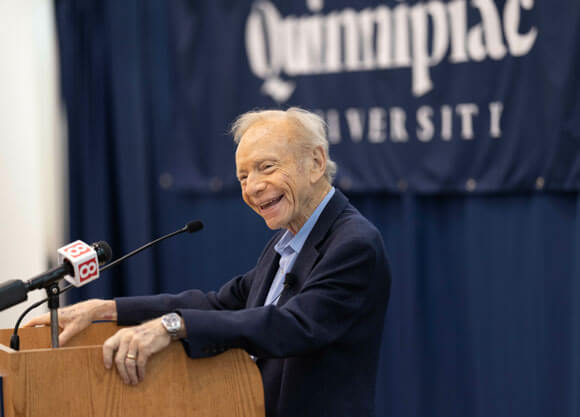
Former U.S. senator ignites unity for Quinnipiac’s Critical Conversations Series
March 11, 2024

March 11, 2024

Quinnipiac’s Interim Vice President for Equity and Inclusion David Fryson introduced Lieberman and described the series’ goals. Through conversations featuring impactful speakers, the series seeks to foster an inclusive and intellectually stimulating environment, promoting inclusivity of thought, respectful dialogue, empathetic engagement, and open-mindedness among students, faculty, and staff.
Discussions are designed to empower participants to be better prepared to embrace inclusivity of thought by actively listening to and engaging with concepts and ideas that may challenge their personal values, without dismissing or silencing differing viewpoints.
Lieberman said the goals outlined by the series are critically important not only for Quinnipiac, but for all universities, as well as American society at large, including the government.
“If we could realize the goals that you stated for the Critical Conversations series, it would begin to heal the terrible breaches and division among the American people today, when we most need to be unified to meet the enormous domestic and international changes and challenges of our time,” said Lieberman.
He said the country is facing technological, demographic, and cultural changes causing many Americans to experience a profound sense of insecurity, anxiety and uncharacteristic pessimism about the future.
“And all of this is made more difficult by the collapse of our political and governmental systems into partisan and ideological warfare, which tends much more often to exploit those public anxieties, instead of trying to resolve them collaboratively — to build the bridges that your stated purpose of your Critical Conversations series includes,” Lieberman said.
During his 24 years representing Connecticut in the U.S. Senate, Lieberman worked across party lines to find common ground.
“It was pretty clear to me that I wasn’t going to get much done as a Democrat unless I was working with members of the Republican party,” said Lieberman. “As I look back on the things I’m proudest of in my 24 years, none of them would have happened without bipartisan support.”
Lieberman is also known for his 2000 Democratic vice-presidential run with presidential candidate Al Gore. Their ticket won the popular vote yet lost the election by electoral vote. The contest triggered a landmark decision of the U.S. Supreme Court settling the highly contested Florida recount. Following the court’s December 2000 ruling, Gore conceded to Republican president-elect George W. Bush.
Quinnipiac Associate Provost for Faculty Affairs and professor of Political Science Khalilah L. Brown-Dean asked Lieberman what lessons he took away from the experience of losing the 2000 national election.
“What did I do the morning after Al Gore and I conceded? I went to the Senate. I went right back to work,” said Lieberman. “There is defeat in life that tests you. Everybody at some point either slips or gets down, and the question is, ‘Do you get up?’ and how to get up and make the most of every day.”
Lieberman said there is currently an alliance of totalitarian world governments threatening the nation not just for power and territory, but also fundamentally challenging the premise of America’s democracy.
“They are arguing, quite explicitly, that the time for a country like America is over, and their time has come. I say to you today America will simply not be able to meet these challenges to our future, to your future as students, if we remain as divided as we are today. And we will not restore our national unity without going back to the goals you have set here at Quinnipiac in this series,” said Lieberman.
He said unity lies in the fundamental behavior of listening respectfully and with civility to others, particularly those with differing opinions, and then working together to try to bridge differences.
These qualities of respectful “free argument and debate,” are at the heart of America’s system of government, and tie back to the founding generation, which was “not perfect, but really quite extraordinary,” Lieberman said.
He noted George Washington warned of the danger of the country’s newly formed government becoming divided by factions, which today are America’s two political parties.
“He warned that if that continued, it would compromise the independence of our new country,” said Lieberman. “Today, our independence is not in doubt, but the division among us really threatens our security, our freedom, and our prosperity.”
Lieberman also discussed his current involvement with the No Labels political party. He said the party’s focus on problem-solving presents an alternative to the current two-party system, which is mired in partisan issues and campaigns for partisan advantage, creating division rather than working toward resolution in a bipartisan way.
Lieberman also reflected on Elizabeth Willing Powel's famous exchange with Benjamin Franklin in 1787, as Franklin exited the Constitutional Convention. Powel asked, "Well, Doctor, what have we got, a republic or a monarchy?" Franklin responded, “A republic, if you can keep it.”
“And that is where we are again today,” said Lieberman. “The kind of courtesy and country we have, and government, is up to you, and all of us, as Franklin said. I want to suggest here at Quinnipiac today, we can do no better than aspiring to get us back to where we need to be than if we take the goals of Quinnipiac’s Critical Conversations series and try to realize them in our own lives.”
Quinnipiac Today is your source for what's happening throughout #BobcatNation. Sign up for our weekly email newsletter to be among the first to know about news, events and members of our Bobcat family who are making a positive difference in our world.
Sign Up Now